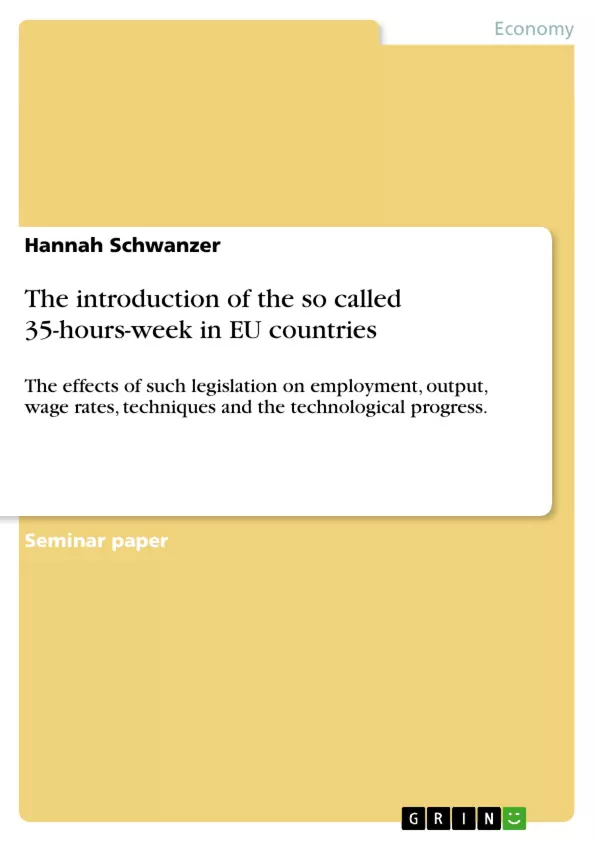Abstract
European economy suffers of high unemployment and welfare costs loom large.
The necessity of taking actions arose. One of them is widely discussed as the introduction of the 35-hours week in European economies. Due to the influence of major economic and social changes, traditional structures are started to be set off.
In the fight for market shares, to positioning themselves on the world markets, and to enhance productivity, performance and competitiveness, changes in the European economic thinking process have to be triggered – action plans need to be developed.
I chose the Volkswagen AG to give an example, how a model (cutting weekly working-hours and wage-rates likewise) is already working.
VW followed through a concept without detours and without getting back hidden benefits by keeping open back doors. They demonstrated, how an even bigger step than the one above is to be realized. They passed all pros´ and cons´, on which other German companies and European Countries could not agree upon by realizing a competitive model.
This paper should give an impression of the effect of such a launch on employment, output, wage rates, techniques and technological progress.
Inhaltsverzeichnis (Table of Contents)
- THE 35-HOURS WEEK
- Management consultancies counterargumented
- ,,VOLKSWAGEN“
- VOLKSWAGENS´,,4 DAYS´-WEEK\" OR 28.8 HOURS/WEEK MODEL
- EFFECTS ON EMPLOYMENT AND WAGE RATES
- EFFECTS FOR THE EMPLOYEES
- EFFECTS ON OUTPUT, TECHNIQUES AND TECHNOLOGICAL PROCESS
- CONCLUSION
- LITERATURE
- EXHIBIT 1.1 - 7
Zielsetzung und Themenschwerpunkte (Objectives and Key Themes)
This term paper examines the effects of a 35-hour workweek on various aspects of a company's operations, specifically using Volkswagen as an example. It explores the potential impacts on employment, output, wage rates, techniques, and technological progress. The primary objective is to analyze whether this legislation can effectively stimulate technological progress.
- The impact of a 35-hour workweek on employment and wage rates.
- The implications for employees and their productivity.
- The effect on output, production techniques, and technological advancement.
- The potential for the 35-hour workweek to stimulate technological progress.
- The analysis of the Volkswagen case study in relation to these themes.
Zusammenfassung der Kapitel (Chapter Summaries)
- THE 35-HOURS WEEK: This chapter introduces the concept of the 35-hour workweek and its relevance in the context of economic changes and challenges faced by European economies. It highlights the need for action to address high unemployment and welfare costs.
- Management consultancies counterargumented: This chapter is not further summarized to avoid spoilers.
- ,,VOLKSWAGEN“: This chapter is not further summarized to avoid spoilers.
- VOLKSWAGENS´,,4 DAYS´-WEEK\" OR 28.8 HOURS/WEEK MODEL: This chapter is not further summarized to avoid spoilers.
Schlüsselwörter (Keywords)
The core themes of this paper revolve around the introduction of a 35-hour workweek, its potential effects on employment, output, and technological progress. The study focuses on the experiences of Volkswagen, examining the impact of a reduced workweek on a major industrial company. Key concepts include labor market reforms, unemployment rates, productivity growth, and the role of technology in economic competitiveness.
Frequently Asked Questions
What is the main objective of this paper?
The paper analyzes the impact of a 35-hour workweek on employment, output, wage rates, and technological progress in European countries.
Why is the 35-hour week being discussed in Europe?
It is seen as a potential measure to combat high unemployment and rising welfare costs while maintaining economic competitiveness.
Which company is used as a case study?
Volkswagen AG is used as an example of a company that implemented a reduced working-hour model (the 4-day week or 28.8 hours/week).
Can a shorter workweek stimulate technological progress?
The paper investigates whether such legislation triggers changes in production techniques and promotes innovation.
What are the effects on wage rates?
The study explores how cutting weekly working hours often correlates with adjustments in wage rates and overall productivity.
- Citation du texte
- Mag. Art., MBA Hannah Schwanzer (Auteur), 1999, The introduction of the so called 35-hours-week in EU countries, Munich, GRIN Verlag, https://www.grin.com/document/70698



